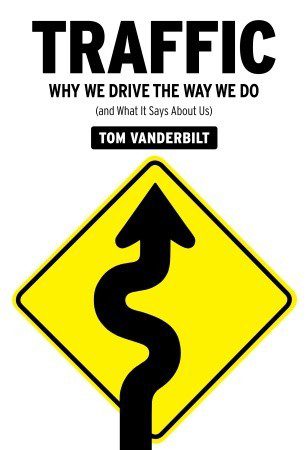Traffic, stoplights, and equity

When I read Tom Vanderbilt’s book Traffic, I noticed that he had a big blind spot. He reviewed the history of traffic. His blind spot is that he looked only at traffic, and how to keep it flowing. He didn’t look at solutions to personal car use.
Notes from the book:
We notice the cars that pass us, in a traffic jam, but we don’t notice when we pass a car. When you are in a traffic jam, it seems like that blue Toyota keeps passing you; the only way that could happen is that you keep passing them, too.
We notice people who get ahead. That awareness can cause resentfulness, especially if the advantage does not seem deserved. Getting ahead in traffic is a mundane problem–a tiny advantage. Yet people do get exercised about it, even to the point of road rage.
What I learned about privilege from understanding my feelings in traffic:
“The first camp–-let us name it after the bumper sticker that says practice random acts of kindness–-viewed early mergers as virtuous souls doing the right thing and late mergers as arrogant louts. “Unfortunately, people suck,” wrote one Random Acts poster. “They’ll try whatever they can to pass you, to better enjoy the traffic jam from a few car lengths ahead of you. . . . People who feel that they have more pressing concerns and are generally more important than you will keep going, and some weak-spined schmuck will let them in further down, slowing your progress even more. This sucks; I’m afraid it’s the way of the world.” [Tom Vanderbilt, Traffic]
Merging idea, from the book:
Tom Vanderbilt proposes this: What if there were highway systems that throttle the number of cars that could come onto a given highway when traffic is heavy. There would be a red light at the ramp. Drivers would wait until they get a green to enter the highway. (In the real world, this entrance is on a first-come, first-served basis.)
An analogy for understanding equity
Hypothetically: What if we created a privilege system for entering that highway that is timed to not be crowded? Let’s suppose that only late-model cars (3 years or newer) were allowed to go on that highway, and older cars remain behind the red light until traffic on the highway abates, or until all the late-model cars have gone through.
This is not so farfetched. There are VIP services at airports that let people avoid lines and eat better food, for a fee.
This imaginary new-car system privileges wealthier people, who own newer cars. Those older car owners would have longer commute times, some would lose their jobs, because they are late for work. The older car owners would need to decide whether to prioritize buying a new car to get them in the fast lane. Buying a new car may shrink the budget for housing. They would live in less expensive places with not-as-good schools.
The children of the old car owners would see their parents an hour or two less, every day. The children in families who didn’t have a late-model car would grow up with less parental time, or a worse education, or both.
In a state that sets up the new car on-ramp system, if they later decided to stop prioritizing those new cars, it would disrupt the new car owners. Some would think it is unfair. The new car owner could rightfully say that they work hard to be able to buy a new car every three years. Some might feel they deserve to have the fast lane: their cars are better and less likely to break down, their jobs are important, their time is paid at a higher rate….
How would a person who just saved for a new car feel? See how many ways resentment might flow from creating an unequal system, then ending it?
The solution is to stop fast-tracking people with more money. But for those who have been fast-tracked, it feels like a loss when they lose the right to skip that stoplight. Equal feels like less. That doesn’t seem fair. The more sustainable solution is to build more roads or plan our cities more efficiently, so workers can get to work on time. If cars are not competing for open lane spaces, everyone can get to work.